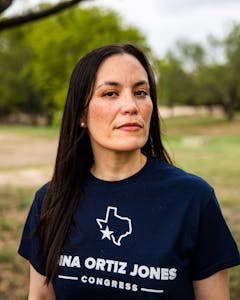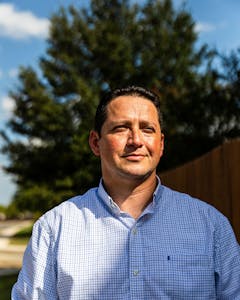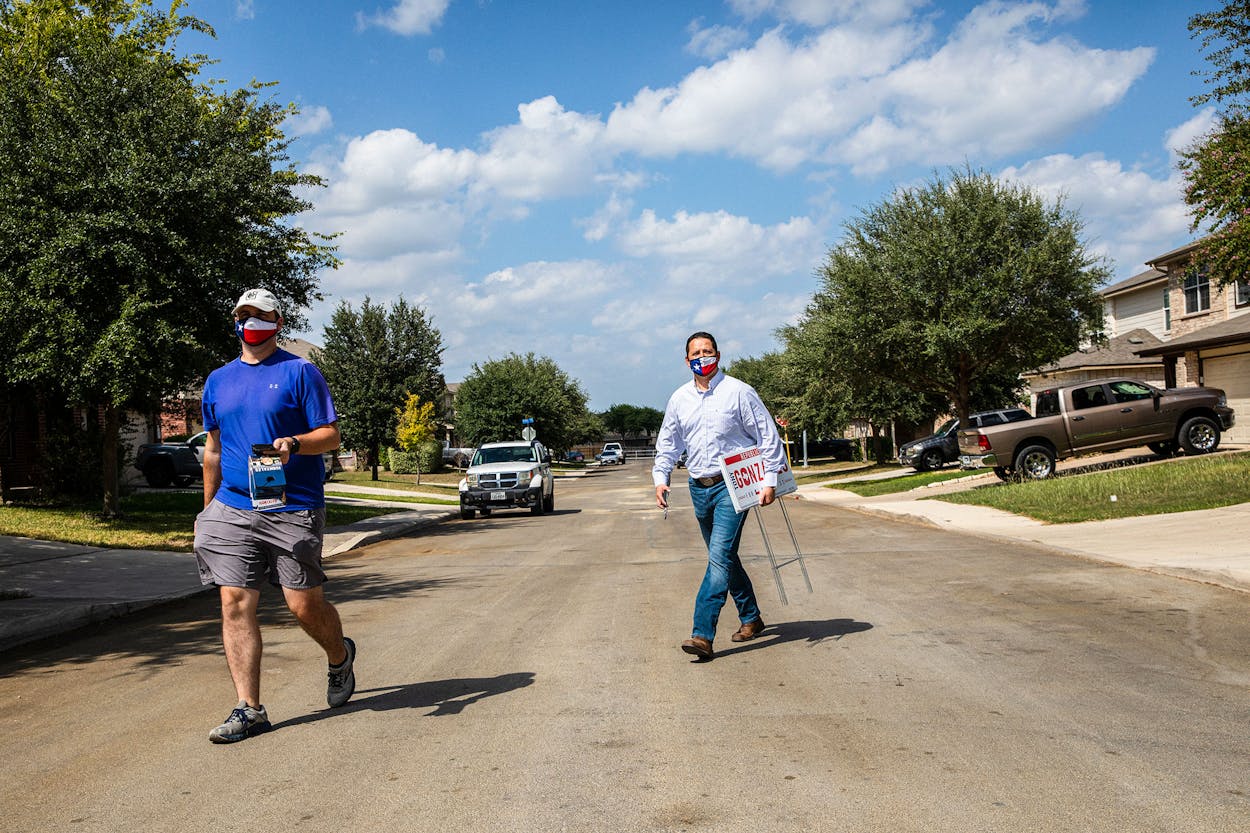The white, one-story house on a south San Antonio cul-de-sac practically screams, “A Republican lives here!” The Dodge Ram 1500 in the driveway sports a bumper sticker proclaiming that “The Second Amendment Is My Gun Permit,” and decorations with the insignias of the U.S. Army and the San Antonio Fire Department adorn an exterior wall. An American flag flying in the yard is black and white, except for a single blue stripe: the thin blue line symbolizing support for law enforcement.
It’s a sizzling August afternoon, and Tony Gonzales, a Republican running for the open seat in Texas’s Twenty-third Congressional District, the vast swing district that encompasses 58,000 square miles from San Antonio to El Paso, presses the doorbell and steps back. After a moment, David Lopez comes to the door.
Gonzales greets him, speaking through a Texas flag–themed face mask. “I’m running for Congress, and I just wanted to drop off some literature and see what issues are important to you.”
Lopez, a sixty-year-old Army veteran and lifelong Republican, steps outside to visit. He’s not wearing a mask. “I don’t like using the mask at all,” he explains, “but I use it when I go out because I’m respecting others.”
Gonzales, a forty-year-old Navy veteran, asks Lopez about his military service. Pointing to a sign over Lopez’s front door proclaiming that “This is a Catholic home,” he notes that he too is Catholic and that he has six kids. And, by the way, he attended a Back the Blue rally in support of law enforcement just this morning.
“It’s going to be a tight race,” Gonzales says, “and it’s going to be all about who’s working harder.”
After a few minutes, they pose together for a photo, and Lopez says Gonzales can count on his support. The scene is an important but quotidian encounter between candidate and courted, one of dozens today. But in a year when nothing is ordinary, the decision to knock on doors—a staple of retail politics in normal times—represents Republicans’ and Democrats’ divergent approaches to campaigning during a pandemic.
Gonzales is trying to squeeze out every vote in a tight race for the Twenty-third, a majority Hispanic chunk of South and West Texas that has swung back and forth between the parties several times over the past decade and a half, a relative rarity in this age of gerrymandering. In Bexar County, the district encircles San Antonio like a left thumb and forefinger that don’t quite touch. Here, near the tip of the thumb, Gonzales and his campaign manager, Michael Blair, are searching for supporters using a list of people whose voting history suggests they might lean Republican. These San Antonians have voted only in general elections, or perhaps in one primary in the last decade.
None of the people who answer their doors appear to recognize his name, but they seem glad to see him and unworried about talking to someone at their door during the pandemic. None of them are wearing masks, and one shakes his hand. Gonzales has the streets to himself: his Democratic opponent, Gina Ortiz Jones, is running a nearly all-virtual campaign.

When the COVID-19 pandemic reached Texas in March, shortly after the primaries, it upended candidates’ expectations for the next eight months of campaigning. The spread of the coronavirus has forced the cancellation of many of the festivals, rodeos, and parades where candidates would normally greet voters. The public health reasons became even more obvious after President Trump announced he had tested positive in October: without proper precautions, rallies and meetings could become super-spreader events. And knocking on people’s doors, widely agreed to be the most effective means of campaigning, could anger pandemic-wary voters or expose canvassers to the coronavirus. But forgoing all in-person contact with the public carries its own set of political risks.
“The calculation you have to make is, do you risk upsetting somebody that you’ve come to their door, or do you put your best foot forward and swing for the ball and run a traditional campaign?” says Jordan Berry, an Austin-based Republican consultant. For many candidates, the answer to that question is a function of which political party they represent. Berry’s clients have been knocking on doors since May, and other Republicans have held meet and greets and spoken at rallies of various sizes. Democrats, on the other hand, have shifted largely to virtual operations. They’re banking on the medium becoming the message: that voters will associate them with prudent decision-making and concern for public health.
“In the apocalypse, you can’t go door-to-door,” says Democratic strategist Colin Strother, who is based in Austin. “Or, at least, it would be extraordinarily irresponsible and selfish and thoughtless.”
In San Antonio, Jones and her campaign staff and volunteers have worked almost entirely from home since mid-March, communicating with voters by phone, text, social media and Jones’s weekly “virtual town hall.” Every Wednesday at 6:30 p.m., Jones sits down on her couch, balances her laptop on a stack of books, and switches on her shadow-reducing ring light. With her terrier mix, Harley, settled at her feet, she launches Zoom and Facebook Live and leads a half-hour discussion of a policy issue such as prescription drug costs or child care. With all questions submitted in advance, the events are subdued affairs compared with the roundtables and town halls the Air Force veteran held during her run for this seat in 2018, when voters could interrogate her face-to-face. Each virtual event ends with a similar benediction: “I hope you stay safe and healthy,” Jones says. “Let us know if you need a yard sign.”
Jones’s campaign two years ago ended in a narrow loss to incumbent Will Hurd, who announced his retirement from Congress last summer. Even after her loss, Jones kept going: knocking on doors in Uvalde and Eagle Pass, shaking hands at the Carrizo Springs–Crystal City football game, and marching in the Fourth of July People’s Parade in El Paso, handing Tootsie Pops to flag-waving spectators. Today her forays in public are limited to brief events where voters can pick up yard signs.


“I would much rather be doing this in person—seeing folks face-to-face, wrapping my arm around them, and letting them know it’s going to be okay,” she says. “But we’ve got to be smart about this, and we’ve got to protect people’s lives.”
Texas Monthly spoke with ten congressional campaigns in the state—six Democratic and four Republican—about their activities. As of early fall, only one of the Democrats was holding in-person gatherings, and none were knocking on doors. (Rick Kennedy, who faces former Dallas congressman Pete Sessions in a Republican district, held a small gathering on a supporter’s lawn in September.) Instead, they were Zooming into meetings of local Democratic clubs, calling donors and voters, and video chatting with volunteers. They were coaching their teams to use relational organizing, a lofty term for evangelizing friends and neighbors about the candidate. A few campaigns were conducting “lit drops,” a lite version of canvassing in which volunteers leave literature or yard signs at homes without knocking. But after the record Democratic turnout for the July primary runoffs, can Democrats maintain their momentum without meeting voters face-to-face?
“It’s definitely something that we’re nervous about as a campaign, and it’s something we talk about on a nearly daily basis,” says Geoff Simpson, the campaign manager for Democratic candidate Candace Valenzuela. The campaign has polled voters in the North Texas district about their attitudes toward the virus and concluded that its target audience would not welcome door-knocking. “While we’re nervous about it from a strategy perspective, and it’s something that keeps me up at night, I think it’s important that we’re keeping the community safe and we’re following the community’s lead.”
Meanwhile, all four Republican candidates were meeting with voters in person, albeit with some precautions. So are many other GOP candidates across Texas. Berry, the Republican consultant, said volunteers for his clients are required to wear masks, keep their distance from voters, and wash their hands regularly. But there’s still a degree of risk-taking. Congressman Michael McCaul, whose campaign suspended door-to-door canvassing and moved meet and greets online after the pandemic began, held summer lunch events at Katy-area restaurants with voters to discuss human trafficking. Congressmen Dan Crenshaw and Chip Roy, both running for reelection, were among the (sometimes maskless) speakers at the Travis County Republican Party’s Ronald Reagan Gala, a large outdoor event in August now under investigation by county officials for appearing to violate rules about gatherings.

Gonzales has zigzagged all over the district, having coffee with voters in Castroville and shaking hands and bumping fists with competitors in the Dimmit County BBQ Shootout in Carrizo Springs. In August he was introduced from the pulpit at Bethel Covenant Assembly of God in west San Antonio, where congregants wore masks but the minister and choir did not (Gonzales briefly removed his mask to speak). A few hours before he knocked on Lopez’s door, Gonzales had worked the crowd of about sixty assembled for a Back the Blue car Men wearing “Law and Order: Vote Trump” T-shirts and members of the Armor of God Motorcycle Ministry gathered in a corner of a strip-mall parking lot. Only a handful, including Gonzales, wore masks.
The wisdom of in-person campaigning is in the eye of the beholder, says Timothy Callaghan, a political scientist in the Texas A&M School of Public Health. Voters who are anxious about the virus might view a candidate going door-to-door as irresponsible. But those who think concerns about the virus are overblown might appreciate the candidate’s commitment to carrying on with normal life. “It really depends more on the voter than on the candidate,” Callaghan says. “If the person’s willing to open their door, chances are it’s the sort of person who is less concerned about the virus to begin with and is going to be receptive to a message like that.”
Gonzales’s gut tells him that canvassing in 102-degree heat will win over swing voters who respect his work ethic. Knocking on doors gives him a greater reach than Jones’s virtual approach, which he says is essentially preaching to the converted.
“You’re counting on people to watch your town hall, as if, ‘Oh my goodness, what is Jones going to say on the town hall this week?’ No one thinks that,” he says. “People are busy. They don’t have an hour to listen to what some politician has to say, and if they do, they’re probably already behind you to begin with.”
Residents opened doors at a half-dozen of the fifty houses Gonzales approached that August day. One man politely asked him to put his campaign literature on the truck parked in the driveway so he could pick it up later: “Just keep your distance,” he said with a smile. Gonzales offered him a yard sign. The man mulled it over.
“Yeah, that’s okay. I’m mostly conservative, mostly Republican, but I go back and forth,” he said. “Thank you, sir. Good luck.” Gonzales left the sign leaning against the truck, unsure if the man would use it.
When Gonzales passed by later, the sign was prominently displayed in the front yard.
“Houses like this is how we will win,” Gonzales said. “It’s almost less about the message and more about showing up.”
Austin journalist Robyn Ross has written for the Texas Observer and the Washington Post Magazine.
This article originally appeared in the November 2020 issue of Texas Monthly with the headline “Viral Campaigns.” Subscribe today.
- More About:
- Politics & Policy
- Pandemic







